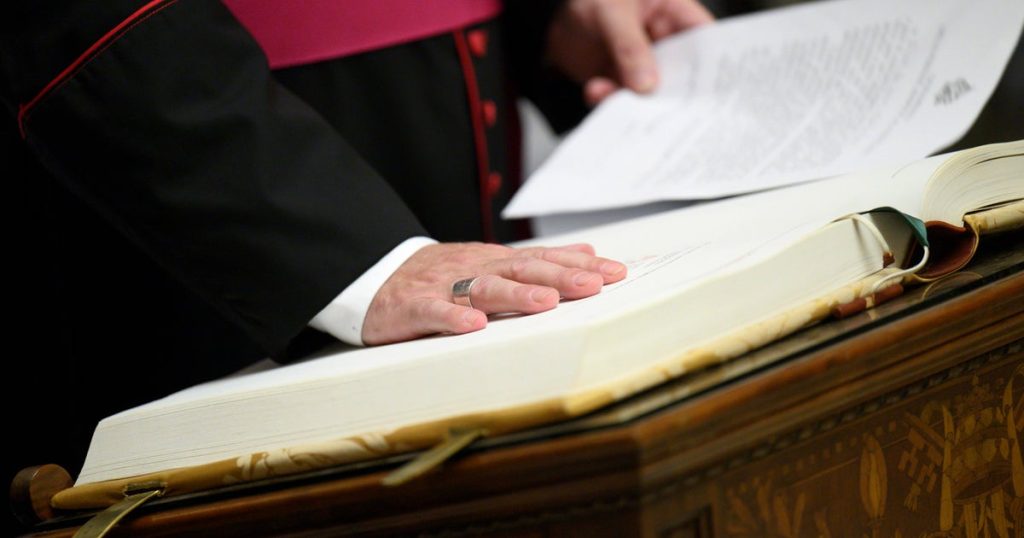In the heart of Vatican City, preparations are underway for the highly anticipated 2025 conclave, which will select a successor to the late Pope Francis. This sacred event involves extensive secrecy, enforced by oaths taken by all Vatican staff, from maintenance personnel to the cardinal electors. As the cardinal electors gather, they will deliberate crucial issues impacting the future of the Catholic Church, including the controversial inclusion of marginalized communities and the evolving role of women.
| Article Subheadings |
|---|
| 1) Secrecy and Oaths at the Vatican |
| 2) The Cardinal Electors’ Upcoming Decisions |
| 3) Challenges Facing the Next Pope |
| 4) Women’s Role in the Church |
| 5) The Emotional Weight of Choosing a New Pontiff |
Secrecy and Oaths at the Vatican
As the 2025 conclave approaches, all personnel involved have pledged to uphold strict confidentiality regarding the proceedings. This includes a variety of roles, from custodians to chefs, all of whom are now bound by an oath of secrecy. The significance of this tradition is underscored by the severe consequence for any breach of trust—immediate excommunication from the Church. Such stringent measures reflect the ancient traditions of the Catholic Church, where rituals are steeped in history and solemnity. The oath ensures that the deliberations and final decisions made within these hallowed walls remain confidential until officially announced.
The Cardinal Electors’ Upcoming Decisions
The essential task at hand for the 133 cardinal electors—those chosen to vote on the new pope—is more than just selecting a leader; it is about steering the future of the Catholic Church, which serves over 1.4 billion followers worldwide. These electors have already begun meetings to discuss potential candidates among themselves, weighing their merits and the paths they envision for the Church. The conclave will take place within the Sistine Chapel, a venue rich with religious and artistic significance, where the cardinal electors will convene under Michelangelo’s compelling fresco, the Last Judgment. This gathering is not merely administrative; it symbolizes the weight of responsibility that these electors carry on their shoulders.
Challenges Facing the Next Pope
The next pope will inherit significant challenges, particularly in navigating social issues that have become focal points of discussion within the Church. One of the most pressing topics is the inclusion of LGBTQ+ individuals, a subject that has seen varied interpretations and acceptance levels among Church leaders. Individuals like Andrea Rubera, whose family faced hardships in their religious journey, express concerns about whether the next pontiff will continue the inclusive spirit fostered by Pope Francis. The reality is that the new pope’s stance on such topics will resonate deeply with many congregants, influencing both attendance and community involvement across parishes.
Women’s Role in the Church
In addition to LGBTQ+ inclusivity, the role of women in the Catholic Church serves as another pivotal issue that the new pope will confront. There have been long-standing debates surrounding women serving as deacons and possibly priests. Despite some progressive movements during Pope Francis’ papacy, the door to significant change remains largely shut, much to the frustration of advocates. Kate McElwee, the executive director of the Women’s Ordination Conference, previously noted that the Catholic Church could face a pivotal moment where women might “vote with their feet” if their roles remain stagnant. The demand for increased representation and opportunities for women within the Church is growing, setting the stage for a crucial dialogue that the new leader will need to engage.
The Emotional Weight of Choosing a New Pontiff
The conclave’s atmosphere is laced with emotional gravity, not just for those electing a new pontiff but for the entire Catholic community. Once a candidate is chosen, he will adopt his papal name and, following the selection, will enter “La Stanza delle Lacrime” or “the room of tears.” This fitting room, where newly elected popes have often found themselves overwhelmed, symbolizes the profound responsibilities that come with the title. As the Church continues to grapple with turbulent issues, the next pope’s decisions will have lasting consequences for countless individuals, further intensifying the significance of these moments.
| No. | Key Points |
|---|---|
| 1 | All Vatican staff involved in the conclave have taken oaths of secrecy with excommunication as a punishment for breaches. |
| 2 | The electors are meeting to discuss potential candidates amid discussions of the future direction of the Church. |
| 3 | The next pope will face significant social challenges, particularly regarding LGBTQ+ inclusion. |
| 4 | There is ongoing debate surrounding the role of women in the Church, pushing for increased representation. |
| 5 | The emotional weight of the papal selection process is profound, impacting both the electors and the global Catholic community. |
Summary
The 2025 conclave represents a pivotal moment for the Catholic Church, where the decisions made will resonate deeply within its vast community. With significant issues such as inclusivity, women’s roles, and the emotional weight of leadership at the forefront, the outcome will significantly shape the future path of the Church. As the cardinal electors gather in solemnity, their choices will be scrutinized and felt among millions, embodying the complexities of modern religious governance.
Frequently Asked Questions
Question: What is a conclave?
A conclave is a gathering of the cardinal electors of the Catholic Church to elect a new pope. It is held in secrecy and is steeped in tradition.
Question: Why is the oath of secrecy important?
The oath of secrecy serves to protect the integrity of the conclave’s deliberations. Breaching this oath can lead to excommunication, highlighting the serious nature of the event.
Question: What are the key issues the next pope will face?
Key issues include the inclusion of LGBTQ+ individuals, the role of women, and how to address the evolving needs of the Catholic community in contemporary society.


